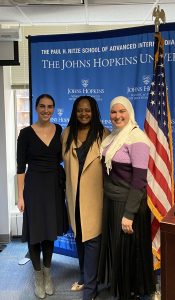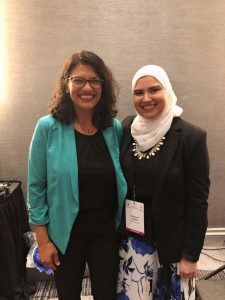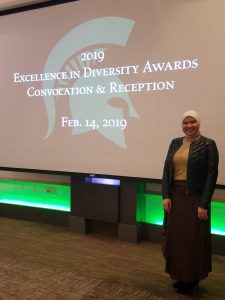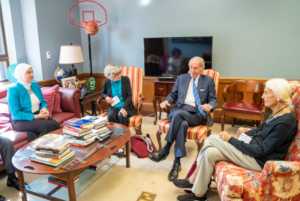The Journey to Demystify Washington, DC
The nation’s political center, Washington, DC, has always been a mysterious and exciting place for a midwestern girl like me. No one I knew growing up worked in politics or even had the desire to, and from afar–especially through the lens of the marginalized American-Muslim community–I understood Washington to be a hotbed for money, status, and privilege.
After traveling to war torn Syria, I came to terms with my own privilege and the helplessness I felt in my inability to aid my community. I made a radical shift and changed my major from Pre-Med to International Relations. Without fully comprehending the magnitude of the journey I was embarking on, I knew one thing: I wanted to dedicate my life to combating oppression, and Washington seemed like the place to be in the fight against injustice.
Being awarded the Scoville fellowship has been one of the most exciting, yet daunting, experiences of my life. The ability to integrate into the beltway — or the inner policy workings in DC — through a program that values and uplifts its fellows has made all the difference in my understanding of Washington, DC. Throughout my fellowship, I have learned several lessons on what the professional and policy world in DC consist of through policy expert meetings, work with NGOs and think tanks, and the Scoville community.

Malas and fall ’19 fellow Katie Dock attending Johns Hopkins SAIS event with Scoville board member Bonnie Jenkins, founder and executive director of WCAPS.
Firstly, feelings like imposter syndrome, or an “internal experience of intellectual phoniness”, can negatively affect how you see yourself and your role in DC, especially for women and minorities. Although DC is a formidable town with accomplished experts, engaging with smart and capable people will make you smarter and more capable. Having a lot to learn does not mean you have less to offer, and many people in Washington are excited for teachable and motivated young people to enter the national security and foreign policy space.
Secondly, the make-up of Washington is changing. The current generation of policy experts has become more diverse than previous generations. Efforts to not only increase the diversity of the field, but also institute meaningful inclusion has become a serious issue many are championing to fix. Programs like Women of Color Advancing Peace and Security (WCAPS) and En Voz Alta (EVA) pave the way for community-building and empowering the diverse next generation of foreign policy and national security practitioners. Although some reports show backsliding on diversity outcomes within the government, initiatives like WCAPS and EVA should persist in order to ensure that the make-up of our government and policy priorities reflect the United State’s true diversity.
Finally — and most importantly — I discovered that there are many coalitions of policy experts and numbers of working groups fighting for the same causes you believe in. From outside the beltway, it’s easy to only notice when the politics prevent meaningful legislation and action. However, working with coalitions and members of the national security and foreign policy communities, as well as simply concerned Americans, to protest war with Iran at the beginning of the year led to successful policy outcomes that are significant for our country. This moment showed the power of grassroots organizing and the capacity of advocacy to coalesce around a cause that will ultimately strengthen the voices of American citizens and democratize foreign policy. With the Scoville fellowship, I had the privilege of witnessing and promoting this work so that when Washington politics become overwhelming, I feel reassured knowing there are allies and champions who work together to push policies promoting the betterment of lives at home and abroad.
The current state of affairs is often disheartening. Endless wars that have cost hundreds of thousands of lives and trillions of dollars, climate change as an existential threat, and a global pandemic that is changing the world as we know it are crises we must come together and address. But Washington DC has ultimately taught me that valuing patience, persistence, and community will allow for meaningful change and progress in our policies and throughout the country.
Sumaya Malas is a Fall 2019 Scoville Fellow at Women’s Action for New Directions Education Fund.



